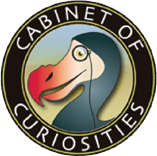History isn't just about one event following another; it's about the human stories that contribute to, or are affected by those events. How did an ancient coin come to be found in a cow's stomach when it was slaughtered in 1924, centuries after the coin was minted? Where does our imagination take us? What might have been the series of 'accidents' that means we can now peer at that groat?
The groat, a silver four pence coin, was minted in the late 1300s. The coin's owner lost it... Did it fall through a hole in a pocket? What clothing would have been common at the time? What materials would have been used? The wearer certainly didn't buy them at a shopping centre. What purse might have been used to carry cash? How important was it to the person who missed it? Was it pocket money or food for the day? How did they make ends meet? Was the loss insignificant, or did it cause financial distress? How would the life experiences then compare to ours?
The coin lay hidden in the undergrowth for centuries. Then at some point, perhaps what was once undergrowth became a field and was turned by a plough. A ruminating herd of cattle passed over the pasture, and one animal swallowed the coin. I eat the beef-burger, but have little clue as to the processes by which it comes to the kitchen. How old is a cow before it is slaughtered? There is a vast gulf between what I eat and my knowledge of how it comes to be on my table. In recent years, horror stories in the news have revealed how little we know about the things we put in our mouths. Should I ask more questions about the farming industry, animal welfare, the source of our food; squeamish questions about factory farming and slaughter-houses... the list is endless.
The long and strange journey of a small piece of metal poses these questions. How many more groats lie beneath our feet? What questions would they pose? And for all those people involved in the groat’s journey, whoever they were: rich or poor, socially significant or common folk, each had mighty influence, because each had opportunity to affect their family, friends and communities. Was their contribution for good or ill? Was their death mourned by many because they were valued by the community? And how are we regarded by those around us?
